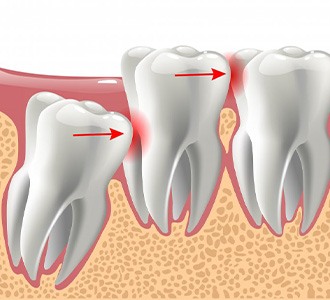Normally when a tooth has become cracked or decayed, we can repair it with a restoration such as a crown or a filling. We’ll also do everything we can to preserve teeth that are threatened by gum disease and other kinds of infections. However, there are cases where Dr. Marable has no other choice but to remove a tooth (or multiple teeth) for the sake of your oral health. Get in touch with Fantastic Smiles to learn more about the process for tooth extractions in Fort Valley, GA and your options for replacing teeth.
Common Reasons for Tooth Extraction

-
Gum Disease: At its most advanced stage, gum disease starts to destroy the bone tissue and ligaments supporting your teeth.
-
Decay: At some point, an infected tooth might be beyond the point of being salvaged; it should be removed before the damage starts to spread.
-
Overcrowding: Sometimes certain teeth might get in the way of orthodontic treatment until they’ve been extracted.
-
Severe Breakage: We’ll have to remove a broken tooth if there’s not enough visible structure left to attach a crown.
How Tooth Extractions Work

A simple tooth instruction involves an instrument called an elevator. It helps loosen the tooth to the point where it can be taken gently out of the mouth with forceps. Certain teeth will need to be removed surgically. Some gum and bone tissue might need to be removed during the process so that we can access the actual tooth. Also, in some cases impacted teeth must be removed in sections instead of as a single piece.
Understanding the Cost of Tooth Extractions

While learning that you need a tooth extraction can be intimidating, it’s also understandable that you’d be interested in knowing what you can expect to pay for it. Once Dr. Marable has determined that extraction is the best way to preserve your oral health, he and the rest of the staff at Fantastic Smiles will make sure that you understand how the treatment works and what will be included in the final bill. Here’s a brief guide to the costs associated with removing a troublesome tooth, but please contact our staff if you have any questions.
What’s the Recovery for Tooth Extractions Like?
Recovery after a tooth extraction typically takes about 1-2 weeks. In the first 24 hours, you may experience bleeding and swelling. Rest, apply ice packs, and avoid physical activity to help manage discomfort. Taking over-the-counter pain relievers or prescribed medication as directed can help reduce pain.
It’s important to avoid rinsing vigorously, drinking through straws, or smoking, as these can dislodge the blood clot forming in the socket, potentially causing a painful condition called dry socket. Stick to soft foods like yogurt, applesauce, or soup for the first few days, and gradually reintroduce solid foods.
Most people return to normal activities within 1-3 days, but full healing of the socket can take several weeks. Regular checkups with us will ensure that healing is on track.
What Are My Options for Replacing a Missing Tooth?
There are several options for replacing a missing tooth:
-
Dental Implant: A titanium post is surgically placed into the jawbone, which acts like a tooth root. A crown is then attached to create a natural-looking replacement. Implants are durable and can last for many years.
-
Dental Bridge: This involves placing crowns on adjacent teeth and attaching a false tooth in the gap. It’s a good option if the surrounding teeth are healthy enough to support the bridge.
-
Partial Denture: A less invasive and more affordable option, these dentures are custom-made to fit and replace missing teeth.
Each option varies in cost, durability, and care requirements. If you’re interested in learning more about the options available to you, we’ll be happy to review them when we meet for your consultation.
Can I Smoke After Getting a Tooth Extracted?
No, smoking after a tooth extraction is not recommended, especially in the first 48-72 hours. Smoking can delay the healing process and significantly increase the risk of developing a condition called dry socket. When you smoke, the sucking motion can dislodge the clot that forms in the extraction site, exposing the bone and nerves beneath. This can lead to severe discomfort and a longer recovery time.
Additionally, smoking introduces harmful chemicals into your mouth that can slow down healing and increase the chances of infection. If you’re a smoker, it's best to refrain for at least a week before and two weeks after the extraction to ensure proper healing. Let us know if you’ve had trouble quitting in the past—we can recommend alternatives that may help you.
What Risks Are Involved with Tooth Extractions?
Tooth extractions are a routine and low-risk procedure; however, there are still certain pitfalls it’s smart to be wary of. One of the main concerns is infection, where bacteria can enter the extraction site, leading to symptoms like fever or swelling. Another potential issue is dry socket, which occurs when the blood clot dislodges, exposing the bone and causing discomfort.
While minor bleeding is normal, excessive or prolonged bleeding may signal that there’s an issue with your healing process and should therefore be brought to our attention. The same goes for discomfort, the worst of which should fade after a week or two under ideal circumstances.
Fortunately, the chances of these problems happening to you are low, particularly if you’re diligent with aftercare. Following our post-operative care instructions can help reduce the chances of these risks and ensure a smoother recovery.








